Zhizhang Fu
ReEfBench: Quantifying the Reasoning Efficiency of LLMs
Jan 07, 2026Abstract:Test-time scaling has enabled Large Language Models (LLMs) to tackle complex reasoning, yet the limitations of current Chain-of-Thought (CoT) evaluation obscures whether performance gains stem from genuine reasoning or mere verbosity. To address this, (1) we propose a novel neuro-symbolic framework for the non-intrusive, comprehensive process-centric evaluation of reasoning. (2) Through this lens, we identify four distinct behavioral prototypes and diagnose the failure modes. (3) We examine the impact of inference mode, training strategy, and model scale. Our analysis reveals that extended token generation is not a prerequisite for deep reasoning. Furthermore, we reveal critical constraints: mixing long and short CoT data in training risks in premature saturation and collapse, while distillation into smaller models captures behavioral length but fails to replicate logical efficacy due to intrinsic capacity limits.
Evaluating the Logical Reasoning Abilities of Large Reasoning Models
May 17, 2025

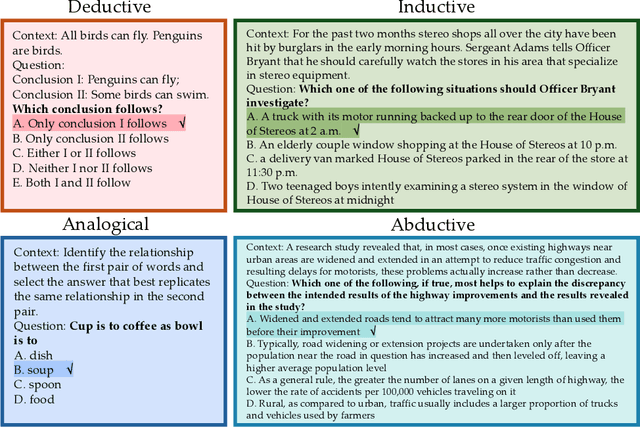
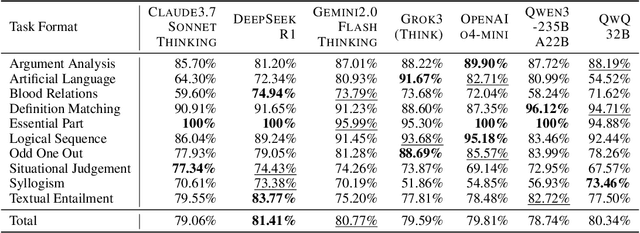
Abstract:Large reasoning models, often post-trained on long chain-of-thought (long CoT) data with reinforcement learning, achieve state-of-the-art performance on mathematical, coding, and domain-specific reasoning benchmarks. However, their logical reasoning capabilities - fundamental to human cognition and independent of domain knowledge - remain understudied. To address this gap, we introduce LogiEval, a holistic benchmark for evaluating logical reasoning in large reasoning models. LogiEval spans diverse reasoning types (deductive, inductive, analogical, and abductive) and task formats (e.g., logical sequence, argument analysis), sourced from high-quality human examinations (e.g., LSAT, GMAT). Our experiments demonstrate that modern reasoning models excel at 4-choice argument analysis problems and analogical reasoning, surpassing human performance, yet exhibit uneven capabilities across reasoning types and formats, highlighting limitations in their generalization. Our analysis reveals that human performance does not mirror model failure distributions. To foster further research, we curate LogiEval-Hard, a challenging subset identified through a novel screening paradigm where small-model failures (Qwen3-30B-A3B) reliably predict difficulties for larger models. Modern models show striking, consistent failures on LogiEval-Hard. This demonstrates that fundamental reasoning bottlenecks persist across model scales, and establishes LogiEval-Hard as both a diagnostic tool and a rigorous testbed for advancing logical reasoning in LLMs.
Logical Reasoning in Large Language Models: A Survey
Feb 13, 2025
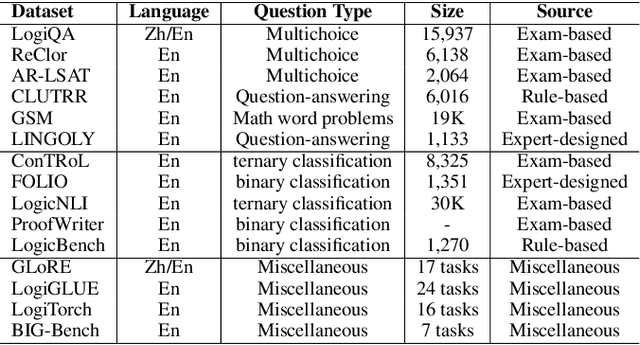

Abstract:With the emergence of advanced reasoning models like OpenAI o3 and DeepSeek-R1, large language models (LLMs) have demonstrated remarkable reasoning capabilities. However, their ability to perform rigorous logical reasoning remains an open question. This survey synthesizes recent advancements in logical reasoning within LLMs, a critical area of AI research. It outlines the scope of logical reasoning in LLMs, its theoretical foundations, and the benchmarks used to evaluate reasoning proficiency. We analyze existing capabilities across different reasoning paradigms - deductive, inductive, abductive, and analogical - and assess strategies to enhance reasoning performance, including data-centric tuning, reinforcement learning, decoding strategies, and neuro-symbolic approaches. The review concludes with future directions, emphasizing the need for further exploration to strengthen logical reasoning in AI systems.
Break the Chain: Large Language Models Can be Shortcut Reasoners
Jun 04, 2024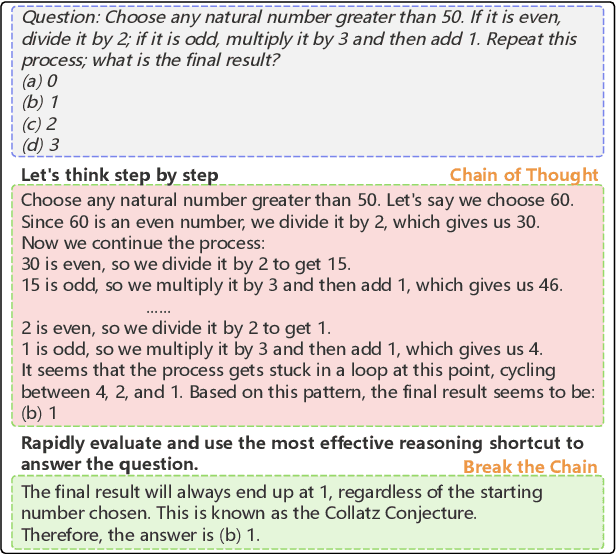

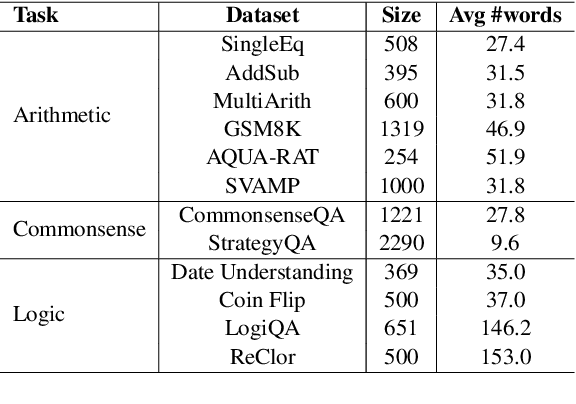
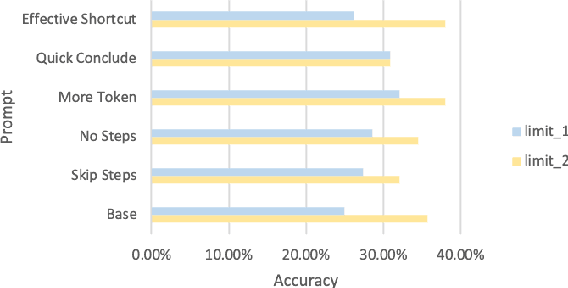
Abstract:Recent advancements in Chain-of-Thought (CoT) reasoning utilize complex modules but are hampered by high token consumption, limited applicability, and challenges in reproducibility. This paper conducts a critical evaluation of CoT prompting, extending beyond arithmetic to include complex logical and commonsense reasoning tasks, areas where standard CoT methods fall short. We propose the integration of human-like heuristics and shortcuts into language models (LMs) through "break the chain" strategies. These strategies disrupt traditional CoT processes using controlled variables to assess their efficacy. Additionally, we develop innovative zero-shot prompting strategies that encourage the use of shortcuts, enabling LMs to quickly exploit reasoning clues and bypass detailed procedural steps. Our comprehensive experiments across various LMs, both commercial and open-source, reveal that LMs maintain effective performance with "break the chain" strategies. We also introduce ShortcutQA, a dataset specifically designed to evaluate reasoning through shortcuts, compiled from competitive tests optimized for heuristic reasoning tasks such as forward/backward reasoning and simplification. Our analysis confirms that ShortcutQA not only poses a robust challenge to LMs but also serves as an essential benchmark for enhancing reasoning efficiency in AI.
 Add to Chrome
Add to Chrome Add to Firefox
Add to Firefox Add to Edge
Add to Edge